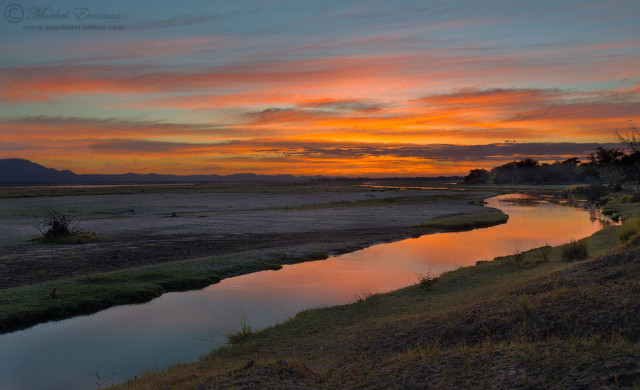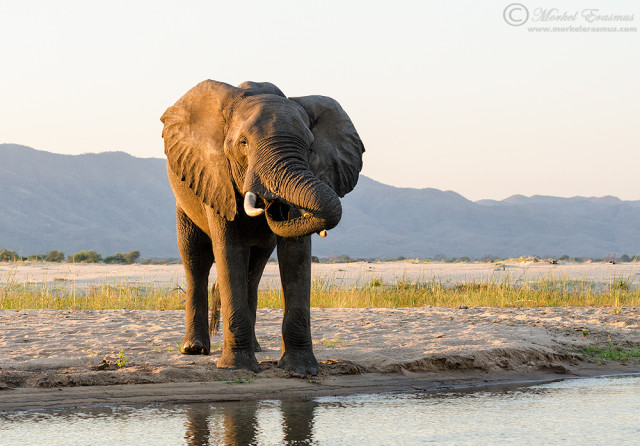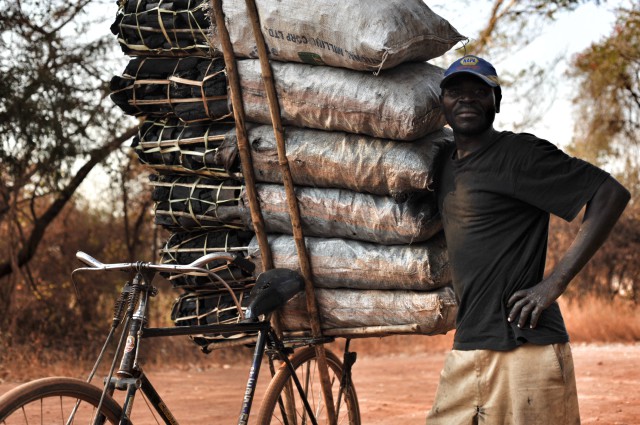Three weeks ago Zambia’s government gave the go ahead for Australian mining and exploration company, Zambezi Resources, to mine Lower Zambezi National Park for copper. Environmental groups challenged the decision and for now it is under review. When I phoned Zambezi Resources for comment I shouldn’t have been surprised to hear a voice recording saying: “访问被阻止 请稍后重试.”

Zambia’s main export partner is China accounting for most of its copper, cobalt, tobacco and cotton. Chinese investment in the country is considerable at over US$ 2.5 billion – not enough to afford Whatsapp, but that would require Zambia’s entire GDP with only a billion left to spare.
Chinese companies run more than 2 000 enterprises in Africa and 500 of them are in Zambia. It’s estimated that more than 80 000 Chinese immigrants live in Zambia encouraged by a 2008 development in which a tax free zone was established for Chinese investors.
The ministry of education has introduced Chinese language in some schools and Chinese culture permeates life in the capital of Lusaka, a notable architectural feature being a large Pagoda housing The Great Wall Casino. The gambling overflow heads to the nearby New Buffalo Casino and as African as the name sounds the punters are mainly from the country once referred to as the Sleeping Dragon. But what does an Australian mining company have to do with all this?
Despite the recession in 2008 mining experienced a boom fuelled by Chinese and Indian growth. Not only have Australian companies benefitted from mining on their own continent, but they have increased their expansion into Africa in order to capitalise on the demand. China often invests in Africa without the conditions attached to Western finance and if foreign companies collaborate with the Chinese in Africa it smooths development. It helps especially if the minerals are heading to China.

Negative environmental impact assessment
“Access is currently blocked, please try again later,” was the English translation that followed the Zambezi Resources telephone recording. I was angling for a comment from company chairman, David Vilensky, on the injunction prohibiting his company from developing the mine. I wasn’t surprised the line was blocked and assumed they had been inundated with calls.
It was a very different affair three weeks previously when Zambia’s Ministry of Lands, Natural Resources and Environmental Protection made the questionable decision to overturn a negative Environmental Impact Assessment (EIA) of the proposed mining project known as the Kangaluwi Copper Project.
One of the critics of the mining project is Zambia’s Tourism and Arts Minister, Slyvia Masebo. She said her Ministry feels that the project should not go ahead because it will put the existence of the Lower Zambezi National Park at risk. Breaking it down in monetary terms, she said, “Government risks losing safari fees amounting to over K84 million and photographic revenue amounting to over K9 million if the mine is allowed to exist.” She is on shaky ground as this amounts to just US$16 million when the Australian company plans to invest more than US$450 million in the project. And as we all know, money tends to cloud any issues in Africa.
The key issue is the potential environmental impact. Lower Zambezi National Park ranks as Zambia’s third most renowned national park after South Luangwa and Kafue. It covers an area of 4 000 square kilometres with it’s southern boundary along the Zambezi River. On the opposite bank is the famous World Heritage Site, Mana Pools National Park and Lower Zambezi is itself in consideration for World Heritage status. Chances are this would fall away if mining commenced.
“Protecting – and indeed enhancing flora and fauna,” Vilensky
Lower Zambezi is a relatively underdeveloped park with limited access. Most of the lodges are located along the Zambezi shore. But this underdevelopment means the flora and fauna remain largely undisturbed, a distinct advantage in terms of environmental preservation.
An open pit copper mine would seriously affect this. Advocates of the mining operation argue that it would take up just 6% of the park and actually increase tourism because of improved access by road. “We share the concerns of those who have so vocally expressed their opposition to the project,” said David Vilensky in a statement. “For this reason, we are keen to engage with local environmentalists to ensure we can achieve a win-win situation: bringing jobs and prosperity to local communities while protecting – and indeed enhancing – the flora and fauna of the area.”
Vilensky must take environmentalists for fools. How they could possibly enhance and protect flora and fauna is a mystery that is counter to the very concept of mining. One can only imagine improved road access and subsequent increase in tourist revenue is where the proposed enhancement would come from. If so Vilensky is glossing over the negative factors.
Better road access for tourists also means better access for poachers and people from marginalised communities who turn Zambian trees into charcoal in order to eke out an existence. Deforestation due to charcoal manufacture is a major problem in Zambia. Thousands of poor communities can be found along Zambian roads which they use to access woodland and get charcoal to buyers. They bare testament to the misappropriation of Zambian revenue and negate any promise of money from this copper mine benefitting the Zambian people.

Vilensky issued the statement. “Kangaluwi Copper Project will be the cleanest, greenest and safest copper mine ever built, probably anywhere in the world, applying the world’s best practices and technology. Zambezi Resources is a responsible Australian company and understands the importance of conserving the environment, particularly in a sensitive area such as the Lower Zambezi National Park.”
But this can been brought into question. Where developers say the mine will be located on an escarpment 35 kilometers away from the Zambezi, scientist Dr Kellie Leigh, who worked in the area for seven years, says the site is actually 19 kilometres from the river and inside the river’s catchment area. “More importantly, that 19 kilometre distance is meaningless since the identified General Mining Activity Area, in their EIS (Environmental Impact Statement), is less than 1 kilometre from the Chakwenga river and Kangaluwi stream, both of which they identify in their EIS as draining the project site and both of which flow into the Zambezi,” says Leigh.
Australian mining record sullied
Advocates of the project say Australian mining practices are among the most ethical in the world, but their record in Africa and on their own continent is sullied. The very principle of mining in a national park might seem inexplicable to many, but Australia’s Kakadu National Park is also home to the Ranger uranium mine where more than 150 leaks, spills and licence breaches have been reported since it opened in 1981.
A result of Australia’s Asian inspired mining boom is the expansion of the Abbot Point shipping port for exporting coal. To expand the port, millions of tons of sediment are to be dredged and dumped inside the Great Barrier Reef Marine Park. The dredging project has been given the green light by the Australian government.
One of the most significant recent developments in coal production is in the Tete province of Mozambique. The area is reputed to have the largest reserves of coal in the world estimated at almost 7 billion tons. You only need travel along the province’s roads to see the devastation mining has on the environment and communities.
Practices by foreign mining companies in Tete, including Anglo-Australian giant, Rio Tinto, have been brought into question. NGO Southern African Resource Watch highlighted concerns about the way they were relocating Mozambican communities to make way for coal projects – sometimes over 40km from the main road. Among the concerns was insufficient land allocated to communities for sustainable farming and the sometimes requisition of land already claimed by communities.
Underdeveloped and corrupt governance
Ultimately the influences of foreign industry on communities and environment in Africa should be policed by local governments. But its hard to do that with underdeveloped and corrupt governance and the communities affected lack the knowledge and access to information that can help them decide what’s in their best interest and what action to take.
We should applaud foreign development in Africa, it’s just that so much of it is stacked on trucks heading for sea ports. Newly built Chinese roads in Zambia, Tanzania and Mozambique are giving way under the weight of copper and coal and the trees on either side are vanishing as the people who are meant to benefit can do little more than watch the promises disappear, and scavenge wood for charcoal.
Money talks, and so do African governments. They talk of great benefits to nations. These voices reach the people, but the benefits seldom do. The only voice I hear right now is a Chinese recording. Let’s hope the voice that emerges from the injunction is one of sound judgement and reason.
Click here to sign the petition against mining in Lower Zambezi National Park.
To comment on this story: Login (or sign up) to our app here - it's a troll-free safe place 🙂.![]()






